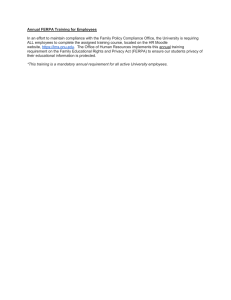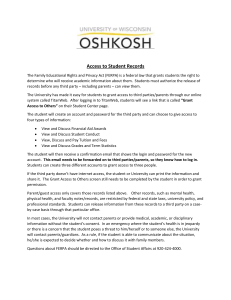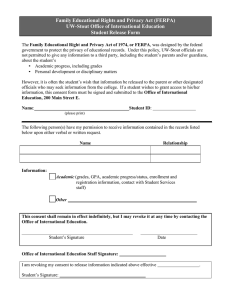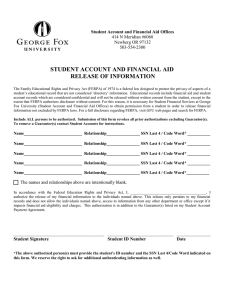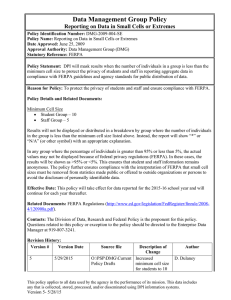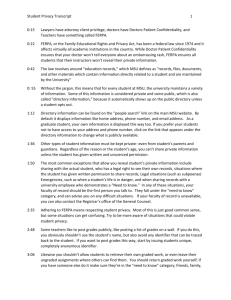Family Educational Rights and Privacy Act of 1974 (FERPA)
advertisement
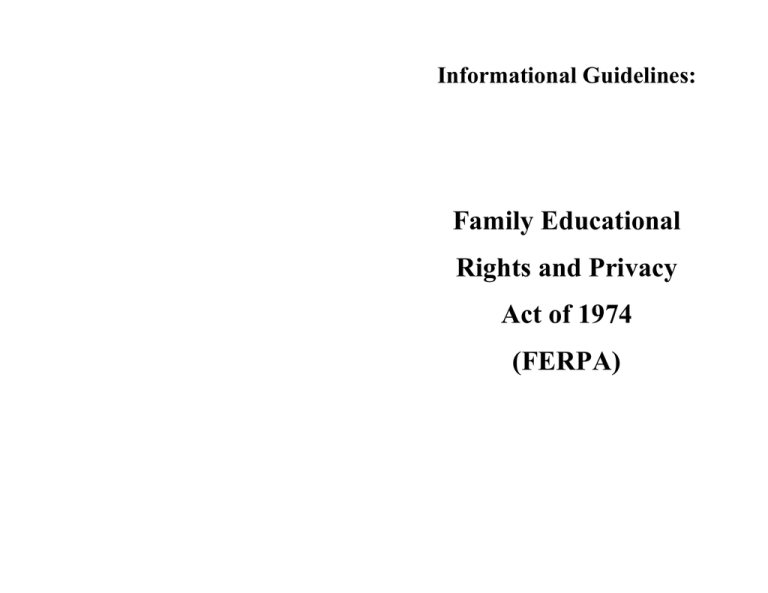
Informational Guidelines: Family Educational Rights and Privacy Act of 1974 (FERPA) The Family Educational Rights and Privacy Act of 1974 (FERPA) FERPA sets forth requirements regarding the privacy of student education records. The intent of the Act is to protect the rights of students and to ensure the privacy and accuracy of education records. The Act provides for the right to inspect and review education records, the right to seek to amend those records and the right to limit disclosure of information from the records. Summary of FERPA: • College students must be permitted to inspect their own education records. • School officials may not disclose personally identifiable information about students without written consent unless such action is covered by certain exceptions permitted by FERPA. • School officials may not permit inspection of students’ records by third parties without written consent unless such action is covered by certain exceptions permitted by FERPA. Who must comply with FERPA: The Act applies to all institutions that are recipients of federal aid administered by the U.S. Secretary of Education. This Act applies to Marist College, it’s employees and it’s students. Who has FERPA rights at the postsecondary level: At the postsecondary (college) level, the basic relationship is between the institution and the student in attendance or the former student. All others, including parents, are third parties. • Student applies to all students attending – including traditional students, continuing education students, students auditing a class, and distance education students. Refers to a student who has reached the age of 18 or who is attending an institution of postsecondary education regardless of age. • In attendance applies to the date that the student first attends a class at the institution. Parental Access to a student’s education records: At the postsecondary (college) level, parents have no inherent rights to inspect their child’s education record. The right to inspect is limited solely to the student (even if the student is under the age of 18). Records may be released to parents only if one of the following conditions has been met: • Through the written (not fax or email) consent of the student • In compliance with a lawfully issued subpoena • By submission of evidence that the parents declared the student as a dependent on their most recent federal income tax form. An institution is not required to disclose information to any parent of a dependent student. However, it may exercise its discretion to do so. Contact the Registrar’s Office with any questions that arise. What rights does FERPA afford students with respect to their education records: • The right to inspect and review their education records. • The right to request an amendment to the student’s education records that the student believes are inaccurate or misleading (this does not cover grade disputes between the student and the faculty member). • The right to limit disclosure of some “personally identifiable information” – known as directory information. • The right to file a complaint with the US Department of Education concerning alleged failures by the college to comply with the requirements of FERPA. • What are education records under FERPA: Education records are defined as records that are: • Directly related to a student, and • Maintained by an education institution or by a party acting for the institution. Education records are not: • Sole possession records or private notes held by school officials that are not accessible or released to other personnel • Law enforcement unit records • Employment records (unless contingent upon attendance) • Medical records • Post-attendance records – alumni records Who may have access to student information? • The student and any outside party who has the student’s written consent • School officials who have “legitimate educational interests” • Parents of dependent students – see “Parental Access to student’s education records” above for guidelines and restrictions • A person in response to a lawfully issued subpoena or court order. Directory Information: Institutions may disclose information on a student without violating FERPA if it has designated that information as “directory information.” At Marist this includes: • name • campus-wide identification number • address • college email address • telephone number • date and place of birth • major field of study • • • • • • participation in officially recognized activities and sports weight and height of members of athletic teams dates of attendance degrees and awards received most recent previous educational institution attended by the student grade level (including number of credits earned) enrollment status (e.g., undergraduate, graduate, fulltime, part-time) Directory Information CANNOT include: • Social Security Number • Race/ethnicity/nationality • Gender Social Security Numbers FERPA protects against unauthorized disclosure or misuse of a student's Social Security Number (SSN) or other identification number. Under no circumstances may a SSN be shared with a third party. Colleges cannot indirectly share or confirm SSN’s. Staff should not ask for the SSN from a third party to identify a student. Staff should not accept the SSN when offered by a third party. In both instances, staff would be indirectly confirming the SSN with a third party. Privacy Holds Students must notify the Registrar in writing should they not want directory information released. In this instance, a privacy hold will be place on the student’s record and releasing such information without signed written consent by the student is prohibited. Inquiries about students with privacy holds must be responded to using the following statement: “We have no information on this person.” It is a violation of FERPA to acknowledge that a person with a privacy hold even exists at the college. Legitimate Educational Interest: The demonstrated “need to know” by those officials of an institution who act in the student’s educational interest, including faculty, administration, clerical, professional employees and student employees who manage student record information. Legitimate educational interest means any authorized interest, or activity undertaken in the name of the College for which access to an education record is necessary or appropriate to the proper performance of the undertaking. Much of a student’s education record can be accessed electronically through Marist’s Student Information System and secured website. It is the responsibility of each school official to understand his or her legal responsibilities under FERPA. The same principles of confidentiality that apply to paper records also apply to electronic data. Just because you can access records, doesn’t mean you should. When in doubt, err on the side of caution and do not release student educational information. Posting Grades by Faculty: The public posting of grades either by the student’s name, institutional student id number, or social security number without the student’s written consent is a violation of FERPA. This includes the posting of grades to a class/institutional website and applies to any public posting of grades for students taking distance courses. Notification of grades via postcard violates a student’s privacy under FERPA. There is no guarantee of confidentiality on the Internet. Therefore, sending grades by email is discouraged. The College would be held responsible if an unauthorized third party gained access to a student’s education record through any electronic transmission method. Leaving personally identifiable, graded papers in publicly accessible places is a violation under FERPA. Examples include: • leaving graded papers, exams etc. on a table for students to pick up on the way out of class • leaving graded papers, exams etc. in a box or unsealed envelop outside faculty’s office for students to pick up What happens if the College does not comply with FERPA: Enforcement of FERPA has been assigned to the Family Policy Compliance Officer within the US Department of Education. The penalty for noncompliance with Federal regulations can be withdrawal of Department of Education funds, but action to terminate funding generally will be taken only if compliance cannot be secured by voluntary means. Do’s and Don’ts Do: 1.) Refer requests for information from the educational record to the Registrar’s Office 2.) Ask for name and date of birth to identify students 3.) Keep only those individual student records necessary for the fulfillment of your teaching and advising responsibilities. Private notes of a faculty member concerning a student and intended for the faculty member’s own use are not part of the student’s educational records 4.) Keep any personal professional records relating to individual students separate from their educational record. 5.) Change factual information regarding grades and performance in an education record when the student is able to provide valid documentation that the information is inaccurate or misleading. The substantive judgment of a faculty member about a student’s work, expressed in grades and/or evaluations, is not within the purview of students’ right to challenge their educational record. Do Not: 1.) Display student scores or grades publicly in association with names, SSN, or other personal identifiers. 2.) Ask for SSN from a third party when attempting to access a student’s record. 3.) Accept an SSN from a third party when attempting to access a student’s record. 4.) Put papers, graded exams, or lab reports containing student names and grades in publicly accessible places (ie: hallways and mailboxes). Students are not to have access to the scores and grades of others in class in ways that allow other students to be identified. 5.) Request or access educational information without a legitimate educational interest and appropriate authority to do so. 6.) Share student educational record information, including grades or GPA with other faculty or staff members unless their responsibilities identify their “legitimate educational interest” in that information for that student. When in Doubt 1.) Don’t give it out 2.) Contact the Registrar’s Office for guidance.
